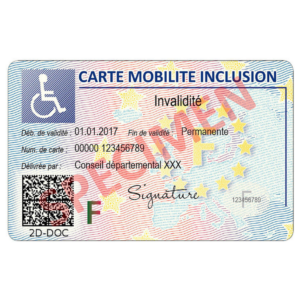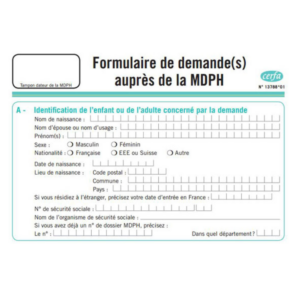Here’s a comprehensive guide to the French Mobility Inclusion Card (Carte Mobilité Inclusion, or CMI), a vital tool for those facing mobility challenges
. This article also features expert advice from Dora Blasberg on obtaining and using the card effectively.
What is the French Mobility Inclusion Card (CMI) ?
The Mobility Inclusion Card (CMI) is an official French initiative aimed at improving accessibility for individuals with disabilities or mobility challenges. Replacing older cards such as the priority, disability, and parking cards, the CMI simplifies access to rights and benefits related to mobility, with a convenient credit card-sized format.
Issued by the MDPH (Departmental Houses for Disabled Persons), the CMI ensures easier access to everyday services and infrastructures. Dora Blasberg, a workplace psychologist, emphasizes that accessible public and professional spaces are essential for fostering inclusion and well-being at work, as highlighted in her insights on recognizing disabled workers.
Did you know there are multiple types of CMI? Let’s explore them below!
The different types of Mobility Inclusion Cards
The CMI comes in three versions, tailored to specific needs:
- CMI Priority: Designed for individuals whose disabilities make standing difficult. This card provides priority access to seats in public transport and public spaces, priority at checkout lines, or the ability to move ahead in queues if no priority line is available.
- CMI Disability: For those with significantly reduced autonomy due to a disability. This card offers additional benefits, including tax reductions and free or discounted public transport.
- CMI Parking: This card allows individuals with mobility challenges to park in designated disabled parking spaces, easily recognizable by the wheelchair symbol.
Did you know? Holders of the CMI Parking card (or the person accompanying them) can park for free and without time limits in all public parking spaces (except in private lots).
These cards can be combined based on individual needs and are issued after an assessment by the MDPH.

Eligibility criteria for the Mobility Inclusion Card
Access to the CMI depends on specific eligibility criteria set by the MDPH:
- CMI Priority: Available to individuals who experience significant difficulty standing.
- CMI Disability: Reserved for individuals with a disability rate of at least 80%.
Applications are reviewed by a multidisciplinary MDPH team, which evaluates autonomy and disability based on physical, psychological, and social factors.
How to apply for a Mobility Inclusion Card in France ?
To apply for a CMI in France, submit a dossier to your local MDPH, including:
- The official application form.
- A medical certificate completed by your general practitioner or specialist.
- Proof of identity (ID copy, proof of address, etc.).
- Relevant medical documents (e.g., medical reports, prescriptions, or physiotherapist attestations).
Applications can be submitted via mail or online through your department’s MDPH portal. Processing times vary but typically result in a card valid for 1 to 10 years. Renewal follows the same procedure. Although French law permits lifetime issuance, very few CMIs are granted permanently.

Benefits and rights of the Mobility Inclusion Card in France
Holders of the CMI enjoy several valuable benefits in France:
- Priority access: Fast-tracked access to public services, public transport, and queues.
- Disabled parking access: Reserved parking spaces simplify daily mobility.
- Tax and social benefits: Depending on the card type, holders may qualify for tax deductions or financial aid.
- 300€ CPF Training Credit: Employees who disclose their disability via RQTH (Recognition of Disabled Worker Status) automatically receive this training credit online. Alternatively, uploading the CMI to their CPF account activates the benefit.
Programs like the CMI contribute to a more inclusive society, aligning with initiatives like Dora Blasberg’s work as an inspiring entrepreneur supporting inclusion.
The Mobility Inclusion Card is more than just an administrative document. It’s a tool for freedom and autonomy, fostering an active, fulfilling, and connected life.
